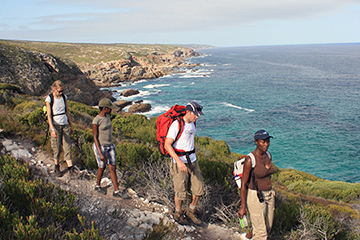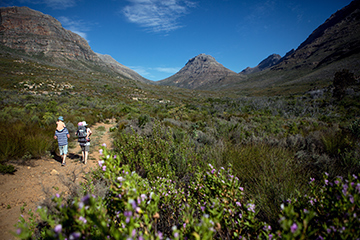Hiking Trails in the Western Cape
The Western Cape is well known for its natural beauty. Unspoilt beaches, mountains, forests, Karoo plains and a unique rich floral kingdom, the Western Cape is a nature lover’s paradise.

Along the coast of the Western Cape, two oceans, the cold Atlantic Ocean in the west and the warmer Indian Ocean from the east, meet at Cape Agulhas, the southernmost tip of Africa.
The Western Cape is home to the smallest of the world's six floral kingdoms, the Cape Floral Kingdom, which is characterised by fynbos and the Protea family, and contains more plant species than the whole of Europe. The Cape Floral Kingdom is 1 of the Western Cape's 2 Unesco World Heritage Sites.
With such a diverse natural beauty on our doorsteps it just natural that people love spending time discovering the pleasure of hiking on trails that can take one along secluded white beaches or the country's largest indigenous forests near Knysna.
Hiking trails in the Western Cape
Table Mountain
The most famous mountain in South Africa, Table Mountain is in the Table Mountain National Park with a network of over 550 walks. For the novice there is easy walks that can be done in a few hours like Platteklip Gorge or for the more adventurous there is also the three-day Hoerikwaggo Table Mountain Trail.
De Hoop Nature ReserveThe De Hoop Nature Reserve is located on the south coast of the Western Cape. It is renowned as the best land based whale watching spots in the world. You can either do the 5 day Whale trail, the 1 day De Hoop Coastal Trail, or the De Hoop Klipspringer trail.
Garden Route National Park
The Otter Hiking Trail in the Garden Route National Park is one of South Africa's most popular trails and is world renowned for its scenic beauty. This 5 day trail will take you along Tsitsikamma coast with forest huts for resting. For day walks, there is the Ratel Forrest Trail with 3 distance options to choose from and and cater for the whole family. The trails will take you through the indigenous forest, where you can see an 800 year old Real Yellowwood tree.

Swartberg Nature Reserve
The 4-day hike in the Swartberg Nature Reserve is suited for more experienced hikers, but people that would like to do the trail at a more relaxed pace, can do the donkey trail where donkeys will carry your luggage while you enjoy the beautiful scenery. This unique 4-day trail combines biodiversity, history and heritage in an exciting experience. There is also a variety of walking and hiking trails available in the reserve, including the Ou Tol, Platberg and De Hoek trails.
Cederberg Wilderness Area
The Cederberg Wilderness Area offers a 4-day heritage route hike for enthusiastic hikers through one of the most undisturbed parts of South Africa. For shorter hikes there is various day hikes to the Wolfberg Arch, Stadsaal Caves and other fascinating rock formations like the Maltese Cross.
West Coast National Park
West Coast National Park with the Langebaan Lagoon as the focal point is known for incredible birdlife, antelope, white sandy dunes and internationally acclaimed wetlands. In spring, the strandveld turns into a tapestry of multi-coloured flowers around Postberg . Here you can do Eve’s trail over 2.5 days just one of the many overnight trails or one of the other shorter walks like the 4.6km hike to Seeberg Viewpoint.
These are just a few of the parks and nature reserves in the Western Cape that offers a wide selection of hiking trails to the experienced and novice hiker. For more information on other national parks you can visit South African National Parks and for reserves please visit CapeNature.

Things to remember before you start your hike.
- Wear comfortable walking shoes, sunscreen and a hat.
- Don’t hike alone.
- Carry enough food and water with you.
- Make sure you know what the weather conditions are before going.
- Take a warm jacket/raincoat in winter.
- Make sure you’ve got a map of the area.
- Take a field medical kit with you for emergencies.
- Obey all signage.
- Stay in a group and on the trails.
To make sure that you and other hikers have a pleasant experience remember these general rules which apply to most nature reserves and parks:
- No pets.
- No firearms.
- No fires.
- No picking of flowers or collecting of seeds.
- No rubbish bags – all refuse must be carried out of the wilderness area.
- No toilets – all waste and toilet paper must be buried with a spade or trowel.
- Don’t use soap or shampoo in the rivers and streams.


